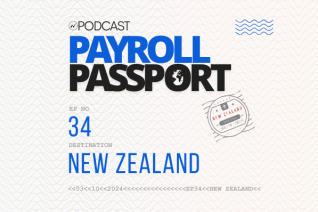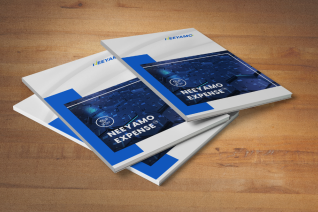Establish your presence globally with Neeyamo as we help you go beyond borders to manage your international payroll and hire new talent in New Zealand.
Overview
Despite its landmass being comparable to that of the United Kingdom, New Zealand has a significantly smaller population, constituting only about 10% of the UK's populace. Surprisingly, most of New Zealand's territory is not occupied by humans but teeming with wildlife. Humans make up just 5% of the population, leaving the remaining 95% to be inhabited by animals. This disparity is so pronounced that a study revealed that for every one person in New Zealand, there are nearly five sheep in the country.
Though the population is considerably small, the concentration of talent within the workforce is high. Do your organization's expansion plans require hiring employees in a country concentrated with talent and skill? Do you lack a physical entity in the country – a key requisite to hire local talent? Neeyamo – one of the top Global payroll providers, assists organizations worldwide with onboarding and managing employees in New Zealand- processing payroll, managing local compliance requirements, benefits, and more.
Tools And Instances
Facts And Stats
Capital
Wellington
Currency
New Zealand Dollars (NZD)
Official Language
English, Maori
Fiscal Year
1st July - 30 June
Date Format
DD/MM/YYYY
Country Calling Code
+64
Time Zone
UTC +12:00 (NZST)
Summer DST UTC +13:00(NZST)
Global Payroll
Overview
What is Global Payroll?
Handling payroll for a widespread workforce can pose a significant challenge for any organization, and the added complication of compliance can make things worse. If companies spend more time processing payroll, it directly impacts day-to-day operations and their overall productivity. The solution to this is global payroll outsourcing.
What is a global payroll system?
Over the years, Neeyamo – a Global Payroll Services provider, has observed these complexities and strived to provide global payroll solutions through a single technology platform – Neeyamo Payroll. Neeyamos global payroll system eases the process for companies looking to outsource their global payroll requirements and aids them in maneuvering the tricky payroll system in New Zealand. Neeyamos payroll software provides the perfect solution for all your global payroll needs – for employees working in primary geographies, the long-tail region, remote or internationally located.
How is payroll calculated?
Neeyamo acts as your personalized Payroll Calculator. Ensuring adherence to local regulatory requirements using multi-level controls. Providing timely and accurate payroll, courtesy of our experts worldwide and using a tech-based integrated smart helpdesk solution with seamless support experience manned by payroll experts - Neeyamo’s Global Payroll Software has all your payroll needs covered.
Payroll Associations
The Global Payroll Association (GPA) is instrumental in supporting individuals and organizations engaged in payroll and its related functions. These associations offer many advantages that foster professional growth, facilitate networking prospects, encourage knowledge exchange, and promote industry advocacy.
Payroll Taxes
Payroll tax is the percentage amount retained from an employee's salary and paid to the government to invest in the general population's welfare. These are statutory in nature and are levied from both the employer and employee. Additional statutory contributions are made by employers towards aiding both short-term and long-term benefits for their employees.
Employee Taxes
The employer taxes in New Zealand are computed as follows:
- ACC Earner Levy (Workplace Injury Insurance) - As of April 1, 2025, employees automatically contribute 1.67% of their earnings (including wages, allowances, and bonuses) through payroll deductions. This deduction applies only up to a maximum earning threshold of NZD 152,790.
- KiwiSaver Retirement Scheme - Employees can choose to contribute 3%, 4%, 6%, 8%, or 10% of their gross pay (with 3% being the default rate).
Employee Personal Income Tax
|
Taxable Income |
Tax on Column 1 (NXD) |
Tax on excess (%) |
|
0 – 14,000 |
- |
10.5 |
|
14,000 – 48,000 |
1,470 |
17.5 |
|
48,000 – 70,000 |
7,420 |
30 |
|
70,000 – 180,000 |
14,020 |
33 |
|
180,000 and above |
50,320 |
39 |
Effective October 2025, Inland Revenue (IRD) New Zealand will introduce new, upfront validations for all payday filing submissions. This update is designed to improve the accuracy of payroll data by rejecting returns that contain errors at the time of submission.
- Total deductions being greater than gross earnings.
- ACC earnings not liable for the ACC levy exceeding the sum of gross and ESS earnings.
- Tax Credit Payroll Donations (TCPD) being more than the PAYE deducted.
- KiwiSaver deductions for employees with a 'WT' tax code.
- Unauthorized payment of Family Tax Credit (FTC) by an entity other than the Ministry of Social Development (MSD).
- Negative hours being paid.
- Using an IRD number that belongs to a non-individual, such as a company.
- Invalid or missing IRD numbers.
- Including a student loan deduction for an employee who does not have a student loan account.
- Including a Child Support deduction for an employee who does not have a Liable Parent Account.
The Accident Compensation Corporation (ACC) Earners' Levy rates and thresholds for the New Zealand Financial Years 2026–2027 and 2027–2028 have been formally confirmed by the Cabinet and the Inland Revenue Department (IRD). These adjustments will change the levy applied to employee earnings and the maximum annual payment.
| Detail | Financial Year 2027–2028 | Financial Year 2026–2027 |
|---|---|---|
| Levy Rate | $1.83 per $100 of liable earnings | $1.75 per $100 of liable earnings |
| Maximum Annual Levy | $2,932.47 | $2,741.22 |
Employer Taxes
The employer taxes in New Zealand are computed as follows:
- ACC Earner Levy (Workplace Injury Insurance) - Employers pay a separate ACC Work Levy, which is calculated based on their total payroll and their industry's risk classification.
- KiwiSaver Retirement Scheme - Employers are required to contribute a minimum of 3% of an employee's gross pay, at least matching the employee's contribution. These employer contributions are subject to Employer Superannuation Contribution Tax (ESCT).
- New Vehicle Reimbursement Rates for the 2025 Income Year
The Inland Revenue Department (IRD) has announced updated kilometre rates for the 2025 income year, which began on April 1, 2025. Businesses use these rates to reimburse employees for using their personal vehicles for work-related travel.
For the first time, the rates for the initial 14,000 kilometers (known as Tier One rates) now vary based on the type of vehicle. This change aims to more accurately reflect the different running costs associated with various fuel types.
Key Updates to Reimbursement Rates:Tier One Rates (for the first 14,000 kilometers, including personal use):These rates cover both the fixed costs (like depreciation and insurance) and running costs (like fuel and maintenance) of your vehicle.
- Petrol Vehicles: NZ$1.37 per kilometer
- Diesel Vehicles: NZ$1.26 per kilometer
- Petrol Hybrid Vehicles: NZ$0.86 per kilometer
- Electric Vehicles: NZ$1.08 per kilometer
- Petrol Vehicles: NZ$0.37 per kilometer
- Diesel Vehicles: NZ$0.35 per kilometer
- Petrol Hybrid Vehicles: NZ$0.21 per kilometer
- Electric Vehicles: NZ$0.19 per kilometer
Payroll Cycle
Overview
Undoubtedly, payroll is a critical aspect of any organization. The Pay cycle is a notable feature that provides a sense of accountability for an employee to be paid consistently for their work.
Frequency
The payroll frequency in New Zealand is bi-monthly/monthly.
13th Month Cycle
Global Work
Overview
An Employer of Record services (EOR) provider helps you eliminate the hassle of handling complexities while onboarding a new employee in an international location. They help bridge the gap that otherwise mandates organizations to have a local registered entity and a local bank account, prior to making a job offer to an international hire.
An international employer of record services (EOR) provider acts as a legal employer, facilitates salary payments, and manages other statutory requirements such as health insurance, payroll taxes, and employee benefits ensuring compliance with local tax laws and regulations.
This allows organizations to focus on collaborating with the employee in New Zealand for operational tasks, with the knowledge that they have a cost-effective solution to support their global HR and payroll software requirements, as they continue their global expansion.
HR Mandates and Practices
Minimum Wage
● Adult Minimum Wage: Increased from $23.50 to NZ$23.95 per hour for workers aged 16 years and older.
● Starting-Out and Training Minimum Wage: Increased from NZ$18.80 to NZ$19.16 per hour.
● A 40-hour minimum wage week will pay an extra $18 weekly or $936 annually (before tax).
Overtime
All working hours over the standard working hours per week are to be paid as overtime and are regulated by employment contracts or collective agreements. Before commencing, overtime must be mutually agreed upon between the employee and the employer.
The payment of overtime hours is not a legal requirement; however, they are usually paid at a rate of 150% of the regular salary rate of pay.
Data Retention Policy
In New Zealand, personnel files must be kept for at least six years. Pay records are kept for seven years.
Hiring and Onboarding Requirements
Hiring
The stage of the hiring process in New Zealand is as follows:
- Describing the job
- Attracting suitable applicants
- Interviewing
- Choosing the best applicant
- Making the offer and finalizing the employment agreement
- induction and settling the employee into their job
Onboarding
Good induction sets the tone and expectations for the employee’s relationship with their manager and the organization, and helps an employee understand the purpose, functions, and tasks of their job so they can perform at their best.
The employee should feel that they are supported and valued during the induction rather than it being just about the manager ticking off a checklist.
The induction does not have to be completed by one person and doesn’t all have to be done on the first day.
Sometimes, too much information all at once can be hard to take in and retain. The induction can provide information on aspects such as the organisation’s history, values, culture, services offered, customers, staff, policies, practices and expected behaviour.
Probation
-
The statutory probation period in New Zealand begins on the first day at work and can be for up to 90 days.
-
The actual timeframe will be stipulated in the employment contract and only applies to employees who have not worked for the employer before.
Leave
Public Holidays
There are 10 national public holidays in New Zealand:
- January 1: New Year’s Day
- January 2: The Day after New Year’s Day
- Febraury 6: Waitangi Day
- April 18: Good Friday
- April 21: Easter Monday
- April 25: ANZAC Day
- June 2: King's Birthday
- June 20: Matariki
- October 27: Labour Day
- December 25: Christmas Day
- December 26: Boxing Day
Sick Leave
-
Entitlement: Employees receive 10 paid sick days per year once they have completed six months of employment.
-
Eligibility: This entitlement applies to employees who work a minimum of 10 hours per week and meet other specified criteria.
-
Usage: Sick leave can be used for an employee's own illness or injury, or to care for a dependent.
-
Carry-Over: Unused sick leave can be carried over to a maximum of 20 days. However, sick leave cannot be cashed out.
Maternity Leave
Maternity leave is called Primary Caregiver Leave in New Zealand, and it is accessible to:
- Female employees who are expecting a child, her partner or spouse, and employees who will permanently be in charge of providing the majority of the care, development, and upbringing for a child under the age of six; this includes adoption but excludes foster care or other temporary care arrangements. If the employee is married or living with a partner, they can decide who will be the main caregiver.
- Pregnant employees are eligible for 26 weeks of primary care leave and are compensated by the government between 177.00 NZD and 585.80 NZD per week before tax.
- When it is due for childbirth or when the employee has a child, primary caregiving leave begins on the due date. In any other scenario, primary caregiver leave begins when the employee is named the child's primary caregiver. Up to six weeks (or sooner with the employer's permission) before the baby's due date or the time the employee will take on the role of primary caregiver for the child, the employee may begin their primary carer leave.
Paternity Leave
In New Zealand, paternity leave is referred to as partners leave. Partners are entitled to leave beginning 21 days before the baby's due date or the day the employee's partner or spouse assumes primary responsibility for a child under the age of six. This ends 21 days after the baby is born (unless the child is discharged from the hospital more than 21 days after the birth, in which case the partner's leave timeframe ends on the day the child is discharged).
Parental Leave
Increased Maximum Weekly Rate:
Effective July 1, 2025, the maximum weekly parental leave payment will be raised to NZ$788.66. Employees who qualify will continue to be paid at their regular earning rate, up to the new maximum threshold.
Support for Self-Employed Parents:
Starting July 1, 2025, the minimum parental leave payment for eligible self-employed individuals in New Zealand has increased to NZ$235 per week.
There is a range of Parental leave options in New Zealand for:
- Special leave - Unpaid leave for pregnancy-related appointments
- Primary carer leave
- Extended leave
- Spouse or partner’s leave
- Negotiated carer leave — If you’re not eligible for work leave.
Bereavement Leave
After completing six months of employment and meeting minimum work hour criteria, employees are eligible for paid leave to address bereavement. This includes up to 3 days for the death of an immediate family member, and 1 day for extended family or close friends. Since April 2021, this leave also covers instances of miscarriage or stillbirth. Bereavement leave can be taken non-consecutively and, if necessary, even during an employee's annual leave. Payment for this leave is at the employee's relevant or average daily pay.
Family Violence Leave
Employees affected by family violence are entitled to 10 days of paid leave per year. This leave is available from the first day of employment, provided the employee meets certain conditions, including typically having been employed for six months. In addition, employees can request flexible work arrangements for up to two months to help them deal with the effects of family violence. Employees are also protected from discrimination due to their experience with family violence. While employers may request proof, they must exercise consideration and sensitivity when doing so.
Jury Service Leave
Employees who are called for jury duty must be granted leave to fulfill this civic obligation. While employers are not legally required to pay employees during jury service, many choose to provide paid leave, sometimes topping up the attendance fees provided by the Ministry of Justice to ensure employees receive their normal pay. Employers cannot compel employees to use their annual leave for jury duty. Furthermore, employees are protected from dismissal or any disadvantage as a result of serving on a jury. The court may also reimburse jurors for certain expenses, such as travel and childcare.
Time Off to Vote
Employers in New Zealand are legally obligated to allow employees time off to vote if they cannot reasonably do so before or after their work hours. Specifically, if an employee is working after 3 PM on polling day, they are entitled to up to two hours off without any deduction from their wages. This provision ensures that all eligible employees have the opportunity to exercise their right to vote.
Employment Relations Education (ERE) Leave
Union members in New Zealand are eligible for paid leave of up to 5 days per year to attend approved employment relations courses. The specific number of days an employer is required to grant depends on their Full-Time Equivalent (FTE) employee count:
- 1–5 FTEs: 3 days
- 6–50 FTEs: 5 days
- 51–280 FTEs: 1 day for every 8 FTEs (or part thereof)
- 281+ FTEs: 35 days, plus an additional 5 days for every 100 FTEs above 280
To access this leave, employees must provide their employer with 4 days notice, including details of the course. Employers can only refuse such requests on reasonable business grounds. This leave is compensated at the employee's ordinary rate of pay.
Termination
Notice Period
The term of notice period is given in the employment contract and typically it is between two and four weeks.
Severance Pay
There is no statutory severance entitlement in New Zealand unless expressly stated in the
employment agreement.
Visa
Overview
A foreign national may apply for a work visa for the following reasons:
- a country that has a specific work program,
- a job offer from a New Zealand firm,
- a particular work-related purpose or event, or
- someone who has been studying there
Some work visas can also result in residence, which is the unrestricted right to live, study, and work.
The New Zealand workforce needs certain skills, experience, and qualifications to apply.
Categories of work visa
Temporary work visa for essential talents that allows working for 1 to 5 years.
From home to office Visas - Temporary visa possibilities that grant residency status after two years of continuous full-time employment.
Working holiday visas - 12 to 23 months of work and travel are permitted. These visa policies vary depending on where you are from.
Employee visas with a specific purpose are designed to accomplish a certain goal. These visas normally have a validity of three to twelve months, while multinational personnel occasionally receive three-year visas.
Relocating business visas are utilized when an employer or corporation moves to New Zealand.
Additionally, beginning on November 1, 2021, all New Zealand employers who employ foreign workers will need to be certified.
Employee Background Checks
Legal and Background Checks
The following legal and background checks are done in New Zealand:
- Criminal records
- Drug screening- If required for employment
- Credit checks- Depends, on if there is a significant financial risk, such as dealing with accounts or financial administration, the short-listed employee has consented.
Last updated on 23rd December, 2025
If you have any queries or suggestions, reach out to us at irene.jones@neeyamo.com
Have Queries? Get In Touch With Us
Get in touch with one of our experts and take a quick demo of our services











